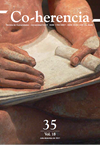The episode of the Sirens in Apollonius of Rhodes’ Argonauts: Comic enrichment and metapoetic aspects
Main Article Content
Keywords
Argonauts, comedy, epic, Odyssey, sirens, Greek literature
Abstract
Just as in the Odyssey the hero on his return journey
must resist the charm of the Sirens, in Argonauts the
heroes must also overcome them on their return to Hélade. Although bibliographic studies note a change in tone between the Homeric model and the Apollonian text (from sinister to humorous and erotic), we consider that they have not acknowledged its important metapoetic value. According to our reading, the confrontation between Orpheus and the Sirens through song represents the relationship of the new poem with tradition and takes
up the meanings and functions of the Odyssey episode, where a clear dispute arises between Odyssey and Iliad, as the classic article by Pucci (1979) shows. In this sense, it is important to highlight not only the tone, but also the presence of a comic diction in the Apollonian episode, which represents the non-epic character of the Sirens defeated by Orpheus.
Downloads
References
Asper, M. (2008). Apollonius on Poetry. En T. Papanghelis & A. Rengakos (Eds.), Brill’s Companion to Apollonius Rhodius (pp. 167-198). Brill.
Brioso Sánchez, M. (2013). Las sirenas en la épica griega: de Homero a las Argonáuticas órficas (II). Habis, (44), 43-59. https://bit.ly/2XLtdX4
Campbell, M. (1981). Echoes and Imitations of Early Epic in Apollonius Rhodius. Brill (Mnemosyne Suppl. 72).
Campbell, M. (1983). Studies in the Third Book of Apollonius Rhodius’ Argonautica. Olms.
Christensen, J. (2018). Eris and Epos: Composition, Competition and the ‘Domestication’ of Strife. Yearbook of Ancient Greek Epic Online, 3(1), 1-39. https://doi.org/10.1163/24688487-00201001
Cuypers, M. P. (2004). Apollonius of Rhodes. En I. J. F. de Jong, R. Nünlist & A. Bowie (Eds.), Narrators, Narratees, and Narratives in Ancient Greek Literature (pp. 43-62). Brill.
De Jong, I., & Nünlist, R. (Eds.) (2007). Time in Ancient Greek Literature. Brill.
Dougherty, C. (2001). The Raft of Odysseus: The Ethnographic Imagination of Homer’s Odyssey. Oxford University Press.
Fantuzzi, M., & Hunter, R. (2007). Tradition and Innovation in Hellenistic Poetry. Cambridge.
Farrell, J. (2003). Classical Genre in Theory and Practice. New Literary History, 34(3), 383-408. https://www.jstor.org/stable/20057790
Fränkel, H. (1961). Apollonii Rhodii Argonautica. Oxford University Press.
Fusillo, M. (1985). Il Tempo delle Argonautiche: Un’analisi del racconto in Apollonio Rodio. Ateneo.
García Gual, C. (2014). Sirenas: Seducciones y metamorfosis. Turner.
Gresseth, G. K. (1970). The Homeric Sirens. Transactions and Proceedings of the American Philological Association, 101, 203-218. https://doi.org/10.2307/2936048
Harrison, S. J. (2007). Generic Enrichment in Vergil and Horace. Oxford University Press.
Harrison, S. J. (2013). Introduction. En T. Papanghelis, S, Harrison & S. Frangoulidis (Eds.), Generic Interfaces in Latin Literature (pp. 1-18). De Gruyter.
Homero (1993). Odisea (J. M. Pabón, Trad.). Gredos.
Hunter, R. (1993). The Argonautica of Apollonius. Cambridge University Press.
Hunter, R. (2008). The Poetics of Narrative in the Argonautica. En T. Papanghelis & A. Rengakos (Eds.), Brill’s Companion to Apollonius
Rhodius (pp. 115-146). Brill.
Kaiser, E. (1964). Odyssee-Szenen als Topoi. Museum Helveticum, 21(4), 109-136. https://www.jstor.org/stable/24813799
Klooster, J. J. (2011). Poetry as Window and Mirror. Brill.
Knight, V. (1995). The Renewal of Epic: Responses to Homer in the “Argonautica” of Apollonius. Brill.
Kyriakou, P. (1994). Empedoclean Echoes in Apollonius Rhodius’ ‘Argonautica’. Hermes, 122(3), 309-319. https://www.jstor.org/stable/4477023
Merkelbach, R. (1969). Untersuchungen zur Odyssee. Beck.
Meuli, K. (1921). Odyssee und Argonautika. Crown octavo. Weidmann.
Mori, A. (2008). The Politics of Apollonius Rhodius’ Argonautica. Cambridge University Press.
Morrison, A. (2007). The Narrator in Archaic Greek and Hellenistic Poetry. Cambridge University Press.
Pucci, P. (1979). The Song of the Sirens. Arethusa, 12(2), 121-132. https://www.jstor.org/stable/26308139
Revermann, M. (2013). Paraepic Comedy: Point(s) and Practices. En E. Bakola, L. Prauscello & M. Telò (Eds.), Comic Interactions: Comedy
and Other Genres (pp. 101-128). Cambridge University Press.
Russell, D. A. (1979). De imitatione. En D. West & T. Woodman (Eds.), Creative Imitation and Latin Literature (pp. 1-16). Cambridge University Press.
Schur, D. (2014). The Silence of Homer’s Sirens. Arethusa, 47(1), 1-17. https://www.jstor.org/stable/26322591
Vian, F. & Délage, E. (1996). Apollonios de Rhodes: Argonautiques Vol. III: Chant IV. Les Belles Lettres.
West, M. L. (2005). Odyssey and Argonautica. Classical Quaterly, 55(1), 39-64. https://www.jstor.org/stable/3556238
Zanker, G. (1987). Realism in Alexandrian Poetry: A Literature and Its Audience. Croom Helm.





